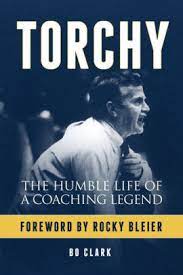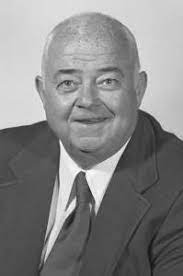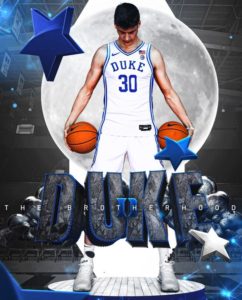There are a lot of great college basketball nicknames out there: Big County, Pistol Pete, etc. 1 of the best coach nicknames was Eugene “Torchy” Clark, the 1st-ever head coach at UCF (then known as Florida Technological University). During his 14 years on the sideline he won 274 games, never had a losing season, and made the 1978 D-2 Final 4. His sons Bo/Mike were not too shabby either, as they still rank 1st & 2nd on the school’s all-time scoring list. Torchy passed away in 2009 but HoopsHD’s Jon Teitel got to chat with Bo/Mike about playing for their father and his success on the football field. Today marks the 13th anniversary of Torchy’s passing on April 22, 2009, so we take this time to remember his life/legacy.



Your father’s given name was Eugene: who gave him the nickname “Torchy”, and how did he like it? Bo Clark: I wrote a book about my dad called “Torchy”. He got the name as a 7 or 8-year old kid during a sandlot baseball game. Some kid made fun of him by calling him “Torch Head” due to his red hair, which eventually turned into “Torchy”. Everyone thinks that he got it from being a fiery/volatile Bobby Knight-type of coach, which is okay…but that is not the real story. Mike Clark: He was in a baseball game and had red hair and someone called him “Torch Head”. It served him well because he did not like the name Eugene.
At Xavier High School in Wisconsin he went 69-9-2 as a football coach and 208-26 as a basketball coach: how was he able to be so dominant in 2 different sports? B: He started there in 1959 when the school 1st opened and the gym was being built. He was an unbelievable coach during the 1960s. His Lombardian-type intensity and preparation helped but he also had some amazing athletes like future 4-time Super Bowl champ Rocky Bleier. Rocky was the most famous player during my dad’s 38-year high school career and played both football/basketball. The 2 of them went 96-4 in both sports, including 27-0 in 3 years of football! Back then Wisconsin did not have a state playoff system so if you were the #1 team in the final football poll then you ended up winning the title, which he did in 1962 (they also won the state basketball title that year). He played basketball at Marquette in the late 1940s, which is where he met my mom, then started coaching in high school after he graduated. I really do not know how he had so much success in both sports: football would end on a Friday night and after 2 days off he jumped right into basketball. M: It was amazing that he got to be a football coach. When he graduated from Marquette he was told to only coach basketball but the job offer was to coach both. He was really good at calling offensive plays and might have been a better football coach than basketball coach.
In 1969 he moved to Florida to start the UCF program (then known as Florida Technical University) from scratch: why did he take the job, and how difficult was it for him to get the program off the ground? B: I interviewed a lot of my dad’s players about how he got the program started at UCF. He also left a box with a lot of notes so I used much of that in my book. He had things at Xavier going very well and probably could have stayed there for 50 years but he was really intrigued at the thought of becoming a college coach. He had a close friend named Bob Willis who managed the Orlando Twins minor league baseball team. Bob migrated from Appleton to Florida and mentioned that 1-year old Florida Tech was starting a basketball program. Dr. Frank Rohter was the athletic director: he talked to Bob and then talked to my dad about it. The 1st year they were a club team and went 11-3 in 1969-70: my brother Mike played for him on that team. My dad was really humbled: he had a 49-game winning streak in high school and then went to Orlando where the team did not even have a gym/uniforms. Now the school has 70,000 students but back then enrollment was around 2,500. He had no scholarships so he just recruited players from the intramural department. Mike was going to play at St. Norbert but about 1 week before school started he decided to play for my dad instead, which was really important and helped out a lot because he knew the system. M: Back then you needed a Masters’ degree to coach in college, which is absolutely not the case today. UCF said he could get his Masters there so he took the job. He did not get the job until August of that year so the “uniforms” were reversible practice shirts: they could wear them at home and then take them on the road. The 2nd year they had not come in yet so we had to borrow uniforms from Rollins College. He kept the basketballs/first aid kit in our garage: it was fun…but it was hard.
During his tenure at UCF he never had a losing season: how was he able to remain so successful for 14 straight years? B: His winning percentage for football/basketball was 82% throughout his career. He was fiery on the field/court but 1 of the nicest people in the world off of it. He really knew both games: basketball was in his blood but we still do not understand how he was so successful at football. I think that it was a combination of his intensity/motivation and some good feeder schools. M: He just knew how to coach. He had a really simple style that was fun to play for due to the offensive freedom it allowed. We started in a 2-3 zone defense and if it was not working then we would try other pressing defenses. I asked him what would happen if none of those things worked…and he said that we would lose!
He was known for not going into the locker room after a win: why did he do that, and how did the players feel about it? B: I coached college basketball for 31 years and think that players love it when their coach does not come into the locker room! I think that he wanted his players to enjoy a win without having to hear that they played a great game. He occasionally would enter the locker room after some tough losses…but he did not lose that often! He is in 7 Halls of Fame and was not afraid to go into a 4-corners offense when he had a small lead in the final minutes. He was a strategist so before the shot clock was instituted he would run a delay game and then watch his team make its FTs. Our gym only held 3000 people but for a D-2 team we were sometimes among the best teams in the country. His teams played with a little fear because they knew he would get after it…but with every good intention in mind. M: He would usually leave us alone because he was totally worn out from coaching so he would just get in the car and go home.
In 1978 he won 24 games in a row and made the D-2 Final 4 before losing to eventual champion Cheyney State (coached by Hall of Famer John Chaney): how close did he come to winning it all, and do you think that he would have won if Bo had not missed the season with a broken right foot? B: I will be humble for this 1. Cheyney State was really good: if we played them 10 times we would probably have lost 8-9 times. I was the #3 scorer in the nation the previous year so after I broke my foot a lot of our fans thought that we would go .500. He decided to redshirt me after we visited the doctor: the team started 2-2 with a pair of losses to D-1 teams and nobody knew what would happen, then they went out and won 24 in a row! I was super-happy for both the team and my dad…but I wondered if I should have redshirted the year before! They had unbelievable chemistry: I think that All-American Jerry Prather was the best player that my dad ever coached. They beat San Diego in the Elite 8 before heading to Missouri for the Final 4: they were unselfish and played good defense despite having a 6’4” center. M: If I remember correctly Cheyney State was a lot taller but Bo could really score.
Both of you played for him and you remain the top-2 scorers in school history: what was the best part of playing for your dad, and what was the not-so-best part? B: I was a 1st-team all-state player in Florida but Mike played for him in both high school/college. I had offers from D-1 schools like Stetson/South Alabama: back in 1975 I was playing against guys like Darryl Dawkins. I went to UCF because I had always wanted to play for my dad since growing up in Wisconsin. He was an unbelievable coach and I just wanted to be a part of that. The best part was the time we spent together: when I played well and we won a big game it was nice to have that father-son camaraderie. It is 1 of the most special parts of playing for your dad. If you asked 100 coaches whether they wanted to coach their son, I think 50 would say yes and 50 would say no. I coached all 3 of my sons at Flagler. They say it is easier if your son is the best or worst player on the team: it is either obvious that he stands out and deserves to play big minutes or he should just sit on the bench. I was intrigued by the Press/Pete Maravich relationship when I was growing up. He was absolutely hard on me but looking back I think he did that on purpose to let the other guys know that there was no favoritism. I did take 25 shots/game…but made 13-14 of them. His legacy is not just UCF: he did some amazing things in high school as well and I was enamored by his success. Rocky was my hero while I was growing up: I wore #23 because of him. M: It was a lot of fun. I also played for him during 3 years in high school. I have heard that the player has to be pretty good or sit on the bench, otherwise it can get dicey. Luckily Bo and I were good scorers so people understood why we played. Riding home with him after a loss had some tension but he rarely lost.
His 274 wins remain the most in school history: do you think that anyone will ever break his record? B: Yes, I think eventually someone will break it, although I am not sure how long Coach Johnny Dawkins will stay there. There are some coaches like Mike Krzyzewski who stay at 1 school for 40+ years but most coaches move around. It was a fun time: my 1st 2 years we used a nearby high school gym and had some unbelievable crowds with a lot of school spirit. Our style of play/success made us fun to watch: the fans were also entertained by my dad’s style of coaching, which was a combination of Rick Pitino/Bobby Knight. People might think that he was whistled for hundreds of technical fouls during his career but he was proud to have only picked up 4 during 38 years as a coach. He understood what the refs were going through due to his own experience as a ref so he made sure not to cross the line while barking at a ref: he wanted that in the book. I was able to use a lot of his own words, which will be neat for his former players to read. M: I know that Kirk Speraw (247 wins) came really close. It is a lot of wins for this day/age: back then they only played 26 games/year but now it is closer to 35.
In 2004 Xavier renamed its gym after him: what did it mean to him to receive such an outstanding honor? B: The kids call it the “Torchy”, which is pretty cool. It was a tremendous honor: they flew him up there and had 2000 people there before a home basketball game. Rocky flew in from Pittsburgh to introduce him and he got a standing ovation. I was not there because I was with my own team but I wish that I would have been there. It was probably 1 of the biggest honors of his life and he was really touched by that. M: That was a big day for him. I teach at UCF as an adjunct and there is another gym named for him here. He spent exactly 40 years of his life in Wisconsin and 40 years of his life in Florida: he liked them both.
He passed away in 2009: when people look back at his career, how do you want him to be remembered the most? B: He does not want people to think of him primarily as a coach, but rather as a great father/grandfather/person. When you talked to him he made you feel good about yourself. The wins/losses are important but not as much as his relationships with his players/coaches/students. After he quit UCF in 1983 he took a 1-year sabbatical and took a job with the CBA’s Wisconsin Flyers. He was not guaranteed a coaching job when he returned in 1984 but was guaranteed a physical education teaching job. He taught for an additional 20 years and could tell stories for 3 hours: he put his heart/soul into it. His classes at UCF were as popular as the Packers in Wisconsin: there would be 40 people showing up for a 30-person class! His records are a little spooky but he would want to be remembered more for the relationships he developed. M: We had a 50th anniversary celebration of UCF basketball recently. He won an amazing amount of games but even if you put the wins aside it is the relationship he had with his players.
*If you would like to pick up a copy of “Torchy: The Humble Life of a Coaching Legend” by Torchy’s son Bo then please go to: www.amazon.com/Torchy-Humble-Life-Coaching-Legend/dp/1732974616











